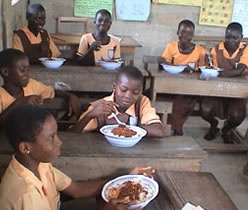 File photo: School feeding programme
File photo: School feeding programme
A former director of the National School Feeding Programme (NSFP), Dr. Kwame Amoako Tuffuor, has stated that accusations that the Kufuor government failed to target the very poor with the NSFP are untrue.
His comments arise from remarks made by the general secretary of the National Democratic Congress, Johnson Asiedu Nketia, on Wednesday April 13 on Accra100.5FM that the former Kufuor administration concentrated the school feeding programme in schools in elitist schools in Accra, Kumasi, and other urban centres, and left out children in rural and poor communities, who needed the programme most.
He also accused the Kufuor government of mismanaging the funds meant for the feeding programme, for which reason its donors – the Dutch government – decided to withdraw their support.
But Dr Tuffuor, in an interview with Chief Jerry Forson on Ghana Yensom on Accra100.5 FM on Friday April 15, refuted the charges levelled against the former administrators of the programme by Mr Asiedu Nketia, nicknamed General Mosquito, saying the NDC stalwart’s attempts to dent the successes chalked by the NSFP under his stewardship were a “diversion” and “deliberately fabricated”.
According to him, an audit report on the school feeding programme under his tenure cleared him of any misappropriation.
Rejecting assertions by General Mosquito that the NPP had brought the programme on its knees, Dr Amoako Tuffuor said: “If you want an idea of how the NDC has destroyed the NSFP, ask the teachers, the cooks…” He said the blame should rather be heaped on the governing NDC since many cooks hired under the programme had not been paid for their services and were purchasing food items from the market on credit to cook for schoolchildren.
Dr Amoako Tuffuor said he adopted a unique strategy to roll out the NSFP in stages while he was at the helm of affairs.
He recounted how he began with only 10 schools nationwide – one per region – where public basic schools in the most deprived areas of the country were selected for that purpose.
“In the next phase, I decided that every district should give us one school. At the time there were about 123 districts and we expanded to cover them. The programme was strategically developed, so, we were able to control it,” he narrated.
He added that before expanding to the next stage, he set up a monitoring team, which visited beneficiary schools to find out if the right kind and quantities of food were being offered the pupils.
He disclosed that in the third phase of the implementation of the programme, a minimum of 10 basic schools per region were added as beneficiaries. Dr Tuffuor insisted that before any schools would be added to the NSFP, his officers would visit the school to conduct an assessment of the poverty situation. He said his office also factored in the situation of the urban poor, hence the inclusion of a number of basic schools from these areas.